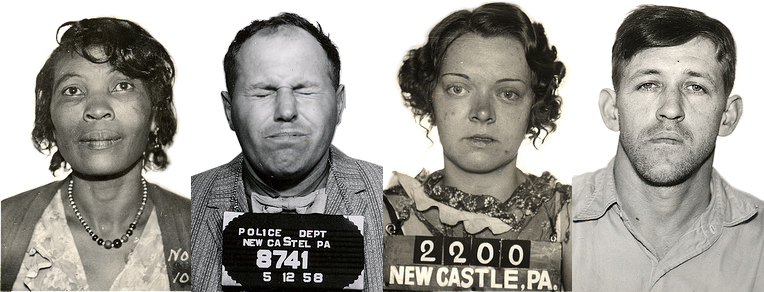In 1789, a revolutionary war veteran named Andrew Nye, the son of a German immigrant who had left Europe forty years before, bought four hundred acres of land on the banks of the Connoquenessing creek and set up a farm, where he lived with his wife, a dozen or so children, a horse, three or four cows and a yoke of oxen. Later generations of his family spoke of him as the first white settler within the bounds of the present Lawrence County, which might well be true.
New Castle was founded a decade later, some miles to the north of Andrew’s farm. By 1851, it had gathered a population of a few thousand people, including Andrew’s grandson, Thomas, who lived in a log cabin on New Castle’s main square. The Nye family continued to clear the land around the Connoquenessing, creating fertile farms that, towards the end of the century, were sold off piece by piece to private developers and industrial concerns who were involved in the creation of the new conurbation of Ellwood City. Some parts of the family grew rich; others did not.
Nathaniel Nye—the great-great-grandson of Andrew Nye—died in 1914, leaving his three children orphans. They were placed in the care of an old farming friend of the family, who was named executor of Nathaniel Nye’s estate and proceeded to sell the remainder of the land that he had owned. What became of the money is unknown but by 1929 at least one of Nathaniel Nye’s children, Frank, then twenty-six years old, was a homeless drifter.
As a teenager, he had spent more than two years in the Morganza reformatory for his delinquent and vicious behaviour. He went to work in a tin factory in New Castle, then joined the navy, spending two terms in the Portsmouth navy yard. After his discharge, he returned to the city, took a room in a hotel and started to look around for something to do.
On a Monday morning in December 1929, Frank was loitering in New Castle’s main square—within a few hundred yards of the site of Thomas Nye’s log cabin, long vanished—when he met a man called Edward Harris. By the end of their conversation, Frank had revealed that he owned a pistol, Edward had replied that he possessed a blackjack, bought for $1 from a Negro in Pittsburgh, and the two men had agreed to work together.
They spent a couple of hours going from store to store, trying to find a suitable prospect before settling on a South Jefferson street clothing store that was run by Louis Ruzewich, a man in his sixties.
The next day, just before six o’clock in the evening, Frank and Edward entered the store and Edward immediately struck Ruzewich on the head with his blackjack. The blow failed to down Ruzewich, who broke free as Harris grabbed for him and ran out into the street, locking the door behind him.
His shouts attracted a crowd of people, who gathered around the store’s front and rear entrances. When Frank worked out how to unlock the door and tried to leave, Charles Chirazzi, who owned the barbershop across the street, pretended to reach for a gun in his rear pocket and told the men to stay in the store. Frank backed off and hid his revolver under a pile of clothes while he waited for the police to arrive.
Officer McMullen was the first on the scene. Frank gave himself up and allowed himself to be handcuffed. Edward was discovered hiding under a counter in the storeroom and also gave up without a struggle.
Frank and Edward were charged with carrying concealed weapons, entering a building with intent to commit a felony and felonious assault and battery. They were sentenced to two to four years in the Western penitentiary at Rockiew, where Frank was given a job as a mail clerk. Six months later, Frank was ordered to deliver a package from the mail office to the main office outside the stockade. On his way out, he stole a suit of civilian clothes and a hat from a changing room and kept walking. He was never heard of again.
Sources: New Castle News (24 Nov 1922, “Local Boy Is Sent To Morganza School”; 13 Sep 1929, “Foil Store Hold-Up”; 14 Dec 1929, “Steve Garlich Indicted For Markota Murder”; 7 Dec 1929, “Pleas Are Entered; Sentences Passed”; 30 June 1930, “Man Sentenced Makes Escape”); Altoona Mirror, 3 July 1930, “Local Man Walks Off From Rockview Prison”; Nye family website main-family.com/nye/index.htm.

Frank’s wild years. A $1 blackjack and a stolen set of civies. Small town noir, I love your work.
Thanks, Andrew. Frank’s wild years, indeed – I hadn’t thought of that, but yes, quite so!
As a Nye family genealogist, I find this information very interesting. My attention is drawn to the parentage of this Frank Nye. I may be misreading the article, but it appears Nathaniel Nye is the father of this Frank. I do not have in my history, a Nathaniel Nye dying in 1914. I have Nathaniel who died in 1905, and another one who died in 1921. The only Frank Nye, in my family history, who is born at the time this Frank would have been born, is not the son of Nathaniel. The information you give appears to have been researched thoroughly, but my resources do not have any of this. Perhaps I have missed someone while doing my family research. Any light you can shine on this, would be much appreciated. Please email me, anytime.
Hi Janice – thanks for writing. I’ll email you next week!
The sentences seem almost Scandinavian in their leniency, America seems to have gone backwards in its treatment of criminals as many by your account didn’t stray again
Who can say? I get the impression the baseline for serious violent crime was a lot higher back then, but I can’t be sure. It really was a different world…